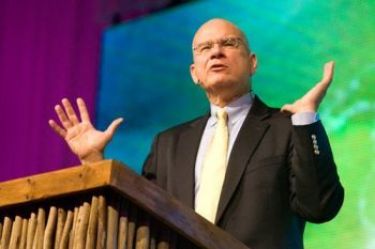
Tim Keller died on 19 May 2023 and, although assured by our Christian hope of the resurrection, it was saddening. At 72, Tim was still a significant preacher, writer and elder statesman in the Christian world. I have a fond memory of being with him in New York and both of us passionately talking about reaching those outside of the church with the good news of Jesus.
I have been greatly helped by his penetrating and powerful books, such as The Reason for God and the Prodigal God.
Tim had many roles – pastor, theologian, writer – but perhaps the most important was that of evangelist. So here, as an evangelist, I want to comment on a few notable aspects of Tim's remarkable life and ministry in proclaiming the gospel.
First, Tim's preaching had confidence. Intellectually, Tim had deep theological roots: he knew what he was talking about. Although committed to a Reformed Christianity, he nevertheless had a sense of proportion and priority and never let secondary theological elements obscure or distract from the great focus of his preaching: Jesus Christ.
Tim readily acknowledged that he had learned from British Christians such as C.S. Lewis, Martyn Lloyd-Jones and John Stott the importance of a 'mere' Christianity that never strayed far from the beating heart of the gospel: sin, forgiveness, Jesus and the cross.
Significantly, although he always sought to reach out to those outside the church, his efforts never involved any compromise of his beliefs. Yet the strength of Tim's preaching was that it was supported by more than intellectual conviction: he had met with Jesus and knew that only Jesus could change lives.
Second, Tim's preaching had grace. There was a warmth and gentleness in his preaching and writing that warmed people to him and to Christ. One of his endearing characteristics was the way that, whether you read him or heard him, you felt that he stood alongside you as a friend and guide. Tim cared and understood, and he offered invitations to a faith in Christ that were hard to refuse.
Third, Tim's preaching had richness. If he saw the fundamentals of the gospel message as fixed and unchanging, he also saw the significance of the gospel as extraordinarily broad. For him, coming to faith in Christ was not any sort of final destination but a beginning; the opening of a door to a new world, full of every sort of implication for how to live and think. It seemed that Tim could never talk or write on a subject without casting some fresh light on it from the gospel.
That he could do this reflected not just his sharp intelligence, but his labours of reading and thinking extensively and deeply on a vast range of subjects. Tim was a firm believer in Abraham Kuyper's famous phrase, 'There is not a square inch in the whole domain of our human existence over which Christ, who is Sovereign over all, does not cry, "Mine!"' Tim believed the key to effectively reaching out to those outside the faith was not to offer an insipid, watered-down gospel, but rather the very opposite; to present a richer, deeper message that captivated and won minds and hearts.
Fourth, Tim's preaching had courage. He had an unshakeable faith that the message of Christ was for everybody; it was what, at depth, all men and women ultimately needed and longed for. That conviction gave him the vision and the courage to take risks. At a time when many people said that the inner cities, with their liberal secular masses, were no-go areas for evangelicals, Tim rejected any idea of retreating and took the gospel to the troubled and turbulent heart of New York. There, to the surprise of many – but not I think to him – his preaching found a receptive hearing.
Tim's courage showed elsewhere. His growing ministry and his many books made him not only a public figure but, inevitably, an obvious target and he found himself under verbal attack, often from within Christianity, for what he said – or didn't say – on theological or political issues. Undeterred, determined and ever peaceable, Tim simply pressed on with sharing Jesus.




